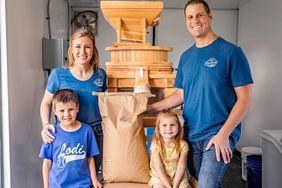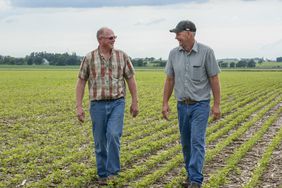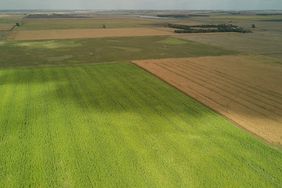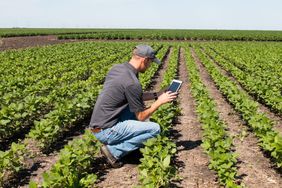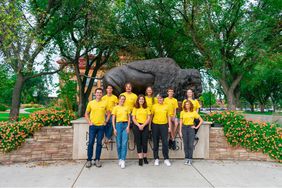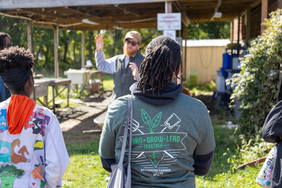:max_bytes(150000):strip_icc()/25866382732_a662a26983_k-2000-d69b96f1e22445309e67ac2c86543aef.jpg)
By Lauren Manning
In recent years, consumers have taken a stronger interest in agriculture and knowing where their food comes from. For some folks, watching a Netflix special or shopping at a local farmers market wasn't enough. Many individuals are eschewing urban life and their 9-to-5 desk jobs in favor of rural living, purchasing homesteads, and diving head first into launching a farm business. Many of these folks soon discover, however, that making the farm dream a reality is a lot more challenging than anticipated, especially when it comes to finding available and affordable farmland.
Even for multigeneration aspiring young farmers, getting into farming can be an uphill climb. According to USDA data, the average age of a principle operator has steadily increased over the last three decades, rising from 50.3 years in 1978 to 58.3 years in 2012. This suggests that farmers are waiting longer to retire, which, in turn, forces many second- or third-generation farm kids to go out on their own until their parents are ready to hand over the reins of the business.
In 2016, I cofounded a chapter of the National Young Farmers Coalition (NYFC) in Arkansas, a national advocacy network of young farmers developing new policies, building networks, and providing business services to ensure all young farmers have the chance to succeed. As a continuing board member, I routinely see young farmers, which the USDA officially defines as anyone who has been farming for 10 years or less, from every background finding it difficult to start a farm or to grow their existing operations. While there are a number of diverse barriers to entry that new farmers are facing, these are the three most common challenges that I hear about.
1. Whose got land anyway?
The first thing that any beginning farmer needs to get started also happens to be the biggest barrier to entry: land.
According to the National Young Farmer Coalition's 2017 survey, 61% of beginning famers reported that access to land was their biggest challenge. This includes not being able to find affordable land as well as not being able to earn enough income from the farm business to support the purchase of the land.
As a result, many beginning farmers are forced to lease land to get started. Although this can create an affordable entryway into agriculture, leases lack stability and certainty. Banks may not be willing to finance a burgeoning operation without a guaranteed land base for at least the beginning of the loan period. With a short-term lease, there are disincentives to setting up the necessary infrastructure and improvements on leased acreage without any guarantee of recouping set-up costs.
The best way to combat the land-access situation is to seek the longest-term lease possible and to cultivate a strong rapport with the landlord. Working with landlords can be challenging, especially if the landlord does not understand agriculture or doubts a young farmer's acumen. It is crucial to always get a lease arrangement in writing and to include terms that will protect the tenant like when and how the lease can be terminated and which farming practices will be explicitly allowed. There are several online resources that provide example farm-lease contracts that hopeful tenants can modify to their specific needs.
Networking can help open doors to lease opportunities that are not advertised on public forums. Many aging farmers are seeking beginners to help manage their property as they shift towards retirement or face prohibitive health problems.
2. Student loan debt can make financing impossible.
Next to land access, student loan debt puts a massive financial obstacle between aspiring farmers and setting up their operations. Forbes reported in January 2018 that there are roughly 44 million student borrowers in the U.S. who owe a collective $1.5 trillion in debt, or an average of $30,000 to $40,000. This can make it difficult to obtain financing, or it can discourage someone from leaving a steady paycheck to make a living as a producer.
Although the USDA offers beginning farmer loan programs that provide preferential treatment and favorable terms for beginning farmers like down-payment assistance, an applicant with substantial student loan debt may be turned away. Most loan programs use debt-to-income ratios to determine whether you will be able to afford additional debt. With some beginning farmers facing student loan payments as high as $1,000 per month, there isn't much room leftover to add a monthly mortgage payment.
Over the last several years, NYFC has advocated for legislation that would include full-time farming in the Public Service Loan Forgiveness Program. The program provides government workers, nonprofit employees, and other types of public-oriented workers with loan forgiveness if they stay employed in that capacity for 10 years. Although the legislation gained some support on Capitol Hill, NYFC has been unable to get it passed.
For those saddled with student debt, this leaves little recourse. Paying down debt is the only way that most beginning farmers facing this obstacle will be able to afford land or receive financing to start their operations. Understanding the USDA beginning farmer loan programs and their criteria can help debt-ridden beginning farmers develop a strategy for positioning themselves to receive financing. Setting up a meeting with local Farm Credit and FSA representatives is also a good way to start figuring out what steps you need to take to qualify for any available programs.
3. Not everyone understands how to run a profitable business.
Finally, even if a beginning farmer finds a land opportunity, it can be a struggle to run a profitable farm business. The excitement and thrill of launching your own farm operation can distract from the necessity of keeping thorough balance sheets and making sure that the operation can support itself. Even if beginning farmers are aware of the need to create a business plan, they may not have the training or background to put one together unassisted. Producers located near urban centers or in areas with a strong food-oriented culture should take advantage of farmers markets, local food-focused restaurants, food hubs, and other direct-marketing channels.
The 2017 NYFC survey indicated that many new farmers wish there were business-planning workshops and support tools available to help them make sure that their new venture will pencil out. This can include everything from finding the right market to understanding which enterprises bring home the most income.
Gary Matteson, a small farmer for many years and now with Farm Credit Council, says, "Let's face it, beginning farmers don't go start farm operations in order to learn how to be accountants. What they need to know is how to interpret good financial records and that it is OK to get help to set up and maintain a good record-keeping system."
There are many online resources geared toward general business planning and free trainings hosted by a variety of sources that can be found through basic internet searches. The USDA's Make a Farm Business Plan features a multistep guide to creating a plan, while the agency's National Agricultural Library maintains a list of other online outlets for business planning including Extension publications. Some business schools also offer free business support services hosted by students as part of community outreach programs.
